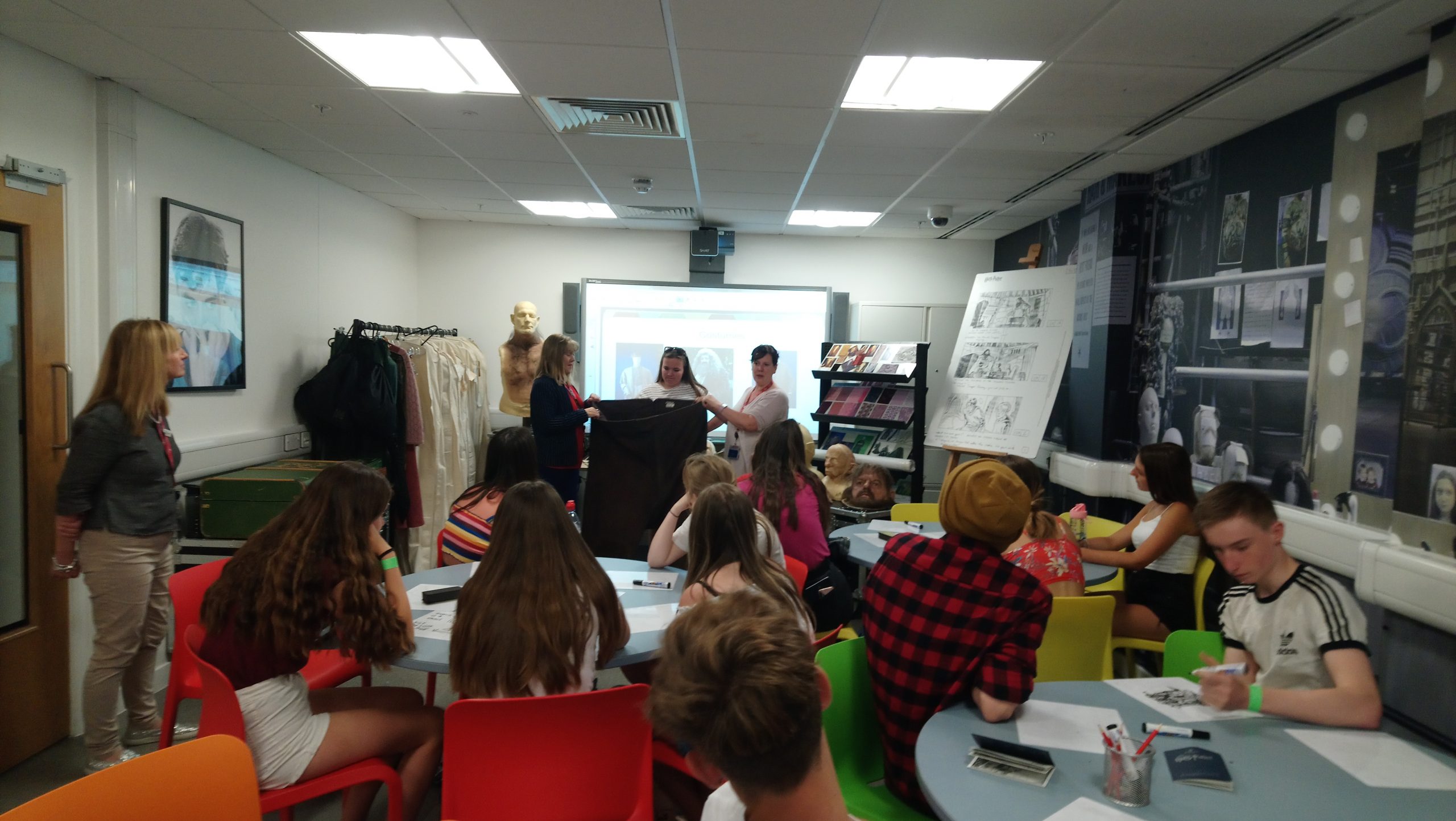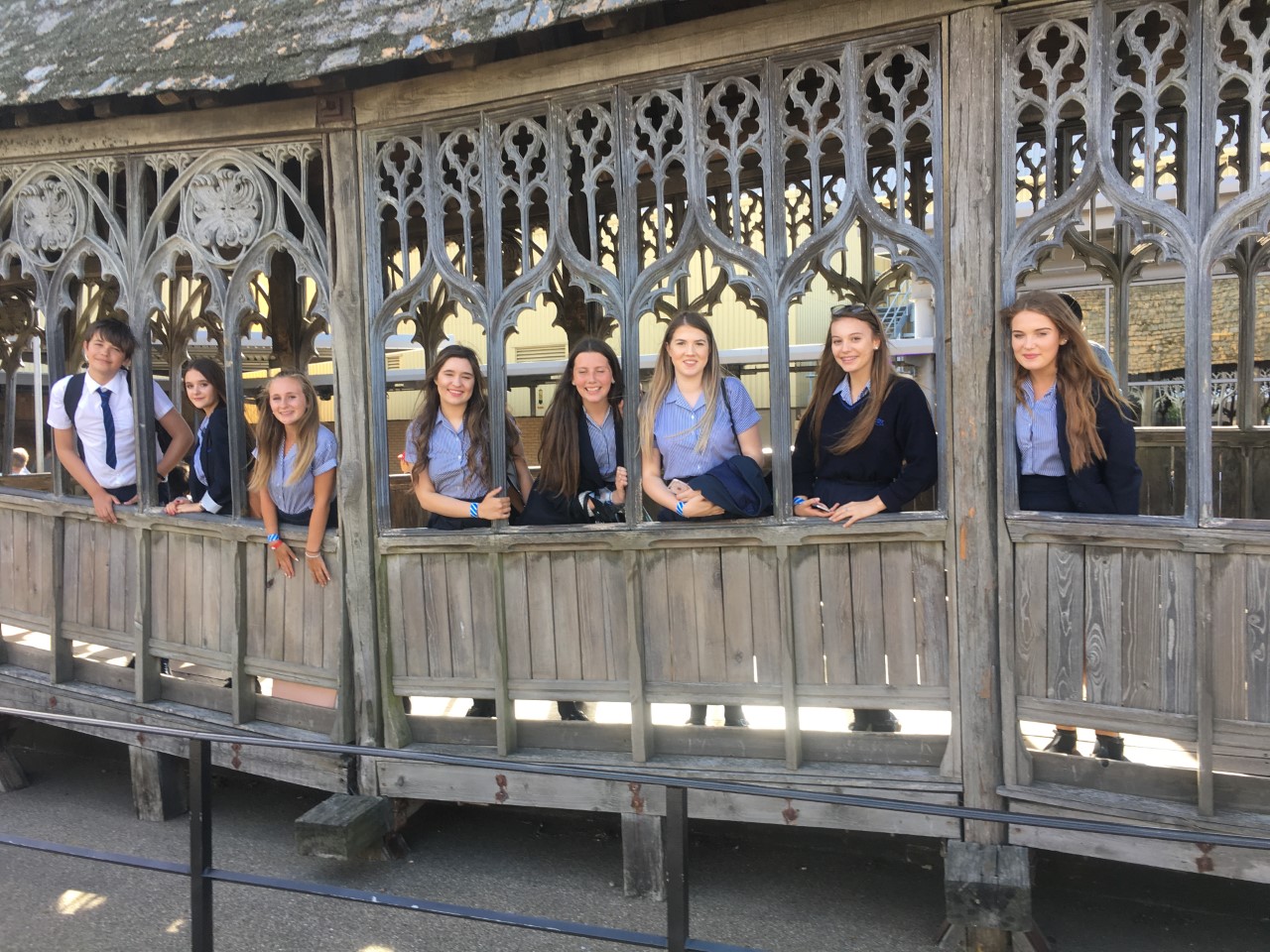Department: Film and Media Studies
Head of Department: Mrs J Evans
If you wish to learn more about the curriculum, please contact the Head of Department by email: j.evans@oaklandscatholicschool.org
If you wish to learn more about the curriculum, please contact the Head of Department by email: j.evans@oaklandscatholicschool.org
We are a small, but dedicated and enthusiastic department and we believe that collaboration feeds creativity. Within the department we have expertise in different areas, including an MA in Creative Media Education, completion of CPD into the academic study of film, experience in the news journalism industry and experience with graphic design and photography. We also have strong links to Media courses at universities and we work collaboratively with Media and Film departments in other schools and colleges.
The combined expertise in the Media and Film Studies department results in carefully constructed lessons that include a range of activities. We are keen advocates of group work in lessons as this way of working allows students to share their ideas and formulate innovative and creative practical work. This also reflects methods of production in industry and allows students to find and assert their own unique voice. As well as this, students collaborate in order to undertake an editing process for practical production in class. They are given specific guidance on how direct, photograph, film and choreograph in order to construct successful media and film products.
Students are also encouraged to engage in active discussion about current media issues and debates during lessons. Teachers are able to facilitate these discussions within a classroom context and the outcome of these are subsequently use as a basis for written class work and assessment. Students have expressed that they feel a sense of ownership over their writing, if their ideas and opinions have contributed to the
The Non Exam Assessed unit allows students the opportunity to formulate a creative response to the texts studied in class as a style model for their own productions in either a print work or moving image format.

The curriculum leaders for Film and Media Studies are also experienced examiners for the Eduqas board, meaning that they are astutely aware of the demands of the mark scheme. This informs classroom teaching and lessons are designed with examination requirements in mind. This expertise is also particularly useful to students who find the wording and demands of examination questions a challenge to decipher as they are given targeted guidance.
Key Stage 4
At KS4 Oaklands currently only offers Media Studies. This is an option subject available to all students at the start of the Key Stage.
Our Key Stage 4 curriculum focuses the formation of analytical conclusions about media texts and institutions.
The students develop skills in discussing, listening, writing and implementing new knowledge and understanding about all texts. They begin to understand the role and influence of large media conglomerates and rehearse the language of Media Studies through the set exam board texts.
We have selected the Eduqas syllabus due to the variety and challenge of the set products of study. These meet the interests of the students as well as challenging them to develop an awareness of the influence of more traditional media forms that they may be less familiar with. All students complete a full course of study, including two examinations and a piece of non-exam assessed creative work. Differentiation is achieved through the choice of both set texts and unseen media, selected by the class teacher with the nature and abilities of their students at the forefront of their planning.
Throughout the GCSE course, students will learn about the role of the media in terms of power, influence, entertainment and creativity.
Membership of the English Working closely with other Media Studies and Film Studies teachers, including shared resource promoting a sense of shared expectation innovative teaching strategies at GCSE
Key Stage 5
At A Level, students can study Film Studies as a separate A Level to Media Studies. Students may choose to study one or both of these subjects depending on their specific interests and career ambitions.
The curriculum encourages students to develop an independent approach to their studies including consideration of their own social media influence, media privacy issues and their digital footprint. The practical NEA work encourages students to think about targeting different audiences through a cross-platform media production piece. Through this work, students also consider how their work fits within the current media landscape.

The specification offers a high level of challenge which will enable students to build on the skills they’ve developed at GCSE, although it is not strictly necessary to study Media at Key Stage 4 in order to be successful at A Level. However, by engaging creatively and critically with a wide range of texts students are equipped for the challenges of the texts in class.
The curriculum encourages students to develop an appreciation of film in its own right, linking the set texts to their historical, cultural, social and political context. Through examination of some of the all time “greats” including, Buster Keaton, Alfred Hitchcock and Stephen Spielberg, as well as the more understated auteurs, students are able to explore a variety of ideologies and styles of film making. Students come to appreciate film as an art form as well as a social commentary, which inspires lively discussion and insightful written response. Students also consider how they might influence the world around them through the medium of film form. The practical NEA work encourages students to express their own creativity and reflect their own experiences of film and society.
Teachers support students in looking at degree, apprenticeship and career options within the field of Media and Film Studies. Many of our past students have been successfully placed at universities and workplaces in various industries.
We have chosen Eduqas as our examination board for both subjects. The specification follows directly from Key Stage 4, with added depth and challenge to suit this Key Stage and the interests and pathways of the students.
How we address values and virtues through the Film and Media Curriculum
Within Film and media there are a number of topics where students can expolore the issues related to Catholic social teaching. Theses include the following:
1.Dignity of the Human Person: Social realist film e.g. I Daniel Blake (Y12/13), News reporting of immigration and refugees (Y10/11)
2. Peace: Global systems and media representations of governance (Y13), Social movements e.g. BLM (Y11) Reporting of social issues e.g. Brexit/the pandemic
3.The common Good: Equality and UN representation of gender #HeforShe movement. (Y12/13), Post-colonial theory and media application (Y13)
4.The Option for the Poor and Vulnerable: The Big Issue as a media product and business model (Y13). – Representations of poverty in the media (Y9/10). Representations of the Favela and Rio (City of God Y13)
5.Solidarity: Global representations of celebratory events e.g. Paralympics, Jubilee (Y9,Y10, Y11, Y12/13). Awareness of social movements and support for global issues through news reporting e.g. Ukraine.
6.The Dignity of Work and the Rights of Workers: TBI (Y13), News representations of Britain, Minimum wage and zero hours contract implications ‘Sorry we Missed You” (Y12/13)
7. Care for God’s Creation: Climate change reporting in news media (Y10/11)
The curriculum for Media and Film Studies is fully inclusive and actively encourages the strengths of individual students. We value the contribution of all class members and believe that each unique skillset and background contributes to rich discussion and excellent, thought provoking practical work.
Through the choice given in terms of practical work, students are able to use the media that they are most confident with to produce results that they are proud of.
At both Key Stages, students are assessed through two examination papers that they will sit at the end of the second year of study.
The Component 1 Media Studies paper assesses student knowledge and understanding of set texts chosen by the exam board, as well as a piece of unseen media. The questions on this paper are a variety of short and long answer questions. The Component 2 Media Studies paper assesses student knowledge and understanding of two or three set areas of media industry and is comprised of longer answer questions that explore areas of study in depth.
The examinations account for 70% of the qualification for both GCSE and A Level. The NEA component is comprised of a piece of autonomous and creative practical work and accounts for 30% of the qualification at both levels.
In A Level Film Studies, students will sit two exam papers, based on the set films that they have studied in class. These will take the format of essay questions. The examinations account for 70% of the qualification. The NEA component is comprised of a short film or screen play and accounts for 30% of the qualification at both levels.
At a classroom level, students are formally assessed half termly throughout Key Stage 4 and 5 in both Film and Media Studies. Targeted and appropriate examination questions are selected, based on the learning of students and students complete questions and receive written feedback. Students are actively encouraged to question feedback and examine mark schemes in light of their written responses. Assessment questions are recorded in books that are kept separately to their class notes, which are organised in folders. Students are aware that, by the end of the first year they should be able to analyse component 1 texts, using media language techniques, and but the end of the second year, they should be able to answer the more in depth questions, as required by the component 2 examination. This is applicable to both Key Stages and both subjects.
We believe that Media and Film Studies should be celebrated as a practical subject, offering a wide range of career opportunities. In the subjects of Film and Media students are surrounded by content that is an expression of local, nation and international culture, this is something unique to this area of the curriculum.
Whilst the classroom experience is paramount to academic achievement in the subject, we also offer students the opportunity to experience industry. This has included trips to BBC Broadcasting House, The Rolling Stones Exhibition, National IntoFilm Festival, The British Film Institute and Warner Brothers Studio Tour workshops. Outside visits and workshops from animation specialists, university representatives, music industry specialists, and BBFC speakers has enhanced the experience of students. Additionally, a film club is available for students to attend during the week to enhance their interest and engagement.

Our Key Stage 4 and 5 curriculums aim to instil a passion for media and develop a creative mindset. Also, we aim to prepare students for an exciting career in a job that may not even exist yet. As such, we teach them to be adaptable and resilient in an ever-changing world. The mastery of literacy skills, in particular writing, discussion and listening are key to success in the subject. There are three areas where we focus our attention:
Disciplinary Literacy:
Expertise in written English is paramount at each Key Stage. Teachers focus on relevant media terminology and students are expected to learn and use key words e.g. Mise-en-Scene, Sound, Editing, Shot Types accurately in their writing.
To this end, students are tasked to create knowledge organisers of set texts, using key terminology and are able to use these written pieces of work to support their extended written work.
The use of modelled examination answers in class provides a more comprehensive understanding of the requirements for success in written responses.
Giving students the ability to read complex academic texts.
Close study of journalistic writing in class, with extended study of key words and phrases familiarises students with this style and format of writing and stretches their perception of the English language.
Wider reading in media and film is encouraged at Key Stage 4 and is an expectation at Key Stage 5. Students are able to access a range of written and viewable texts within the classroom from the extensive library, which includes revision guides, books that provide a more in-depth background to the set texts and texts that provide academic approaches to the subjects, as well as those that are designed purely for enjoyment and entertainment.
Targeted vocabulary instruction
Teaching of individual words that relate to Film and Media that provide meaning to the subject
Varied approach to teaching vocabulary and meaning so students can understand concrete and abstract nouns.